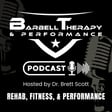
Crossfit Myths Busted: The Truth About Cardio, Recovery & Rrogramming with Anna Wishnowsky
Get ready for an eye-opening episode of the Barbell Therapy Podcast! Dr. Brett Scott is joined by Anna Wishnowsky, a CrossFit coach with a refreshing perspective on training smarter, not harder.
What’s Inside:
✅ Learn how to budget your workout intensity like a pro—your body will thank you!
✅ Discover why CrossFit’s “go hard or go home” mentality might be holding you back from real progress
✅ The shocking truth about active recovery—it’s not what you think!
✅ Barbell cycling: Are you killing your snatch with all that extra volume?
✅ The hidden benefits of dialing it back for better performance—less is more!
Whether you’re a CrossFit enthusiast, a coach, or someone who wants to train smarter, not harder—this episode is a game-changer!
KEYWORDS:
CrossFit, training methodology, workout intensity, athlete identity, Metcons, cardiovascular fitness, programming principles, cardio, CrossFit, weightlifting, training volume, active recovery, programming, movement variability, barbell cycling, performance, fitness.
TAKEAWAYS:
CrossFit culture often emphasizes high intensity and pushing limits.
Budgeting workout intensity can prevent recovery debt.
Conversations about training less can be challenging for athletes.
Athlete identity is often tied to performance and training volume.
Diversifying interests can lead to a more balanced life.
Metcons are essential for competition but may not be the best for development.
Cardiovascular fitness should include longer, moderate-intensity activities.
Programming should focus on minimum effective doses for improvement.
Understanding the emotional reasons behind training habits is crucial.
Effective programming balances strength, skill, and cardio components. The minimum effective dose of cardio can be lower than expected.
CrossFit programs often lack longer, easier cardio sessions.
Simplifying training volume can lead to better recovery and performance.
Maintaining cardiovascular gains doesn't require excessive training.
CrossFit could benefit from incorporating more lateral and rotational movements.
Active recovery is often misunderstood and misapplied in training.
Weightlifting can be effectively integrated into CrossFit programming.
Barbell cycling is a valuable skill that enhances performance.
Movement quality is crucial for preventing injuries and improving performance.
Aerobic training is essential for overall recovery and wellness.
CHAPTERS:
00:00 - Introduction to CrossFit Culture and Methodology
06:03 - The Challenge of Training Less: Conversations with Athletes
11:53 - The Role of Metcons in CrossFit Training
24:03 - Reevaluating Cardiovascular Fitness in CrossFit
35:57 - Programming Principles for CrossFit Improvement
41:15 - Programming for CrossFit and Weightlifting
47:42 - Improving CrossFit Programming
53:18 - Weightlifting in CrossFit
01:06:36 - Rethinking Active Recovery
